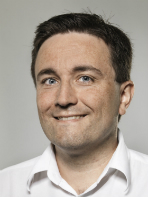
The Pragmatic Text Miner
Life sciences companies are increasingly relying on text and data mining to glean important insights from vast amounts of published information. From drug discovery and clinical trial development to drug safety monitoring and competitive intelligence, text mining has many applications for life science companies.
Join Lars Juhl Jensen, professor at Novo Nordisk Foundation Center for Protein Research at the Panum Institute Copenhagen, as he discusses text mining of biomedical literature, the challenges researchers face in building large collections of content to mine and what bioinformatics professionals need to address these issues.
This session was sponsored by Copyright Clearance Center.
About the Speaker: Lars Juhl Jensen
Novo Nordisk Foundation Center for Protein Research
at the Panum Institute Copenhagen
 Lars Juhl Jensen started his research career in Søren Brunak’s group at the Technical University of Denmark (DTU), from where he in 2002 received the Ph.D. degree in bioinformatics for his work on non-homology based protein function prediction. During this time, he also developed methods for visualization of microbial genomes, pattern recognition in promoter regions, and microarray analysis. From 2003 to 2008, he was at the European Molecular Biology Laboratory (EMBL) where he worked on literature mining, integration of large-scale experimental datasets, and analysis of biological interaction networks. Since the beginning of 2009, he has continued this line of research as a professor at the Novo Nordisk Foundation Center for Protein Research at the Panum Institute in Copenhagen and as a co-founder and scientific advisor of Intomics A/S. He is a co-author of more than 100 scientific publications that have in total received more than 10,000 citations. He was awarded the Lundbeck Foundation Talent Prize in 2003, his work on cell-cycle research was named “Break-through of the Year” in 2006 by the magazine Ingeniøren, his work on text mining won the first prize in the “Elsevier Grand Challenge: Knowledge Enhancement in the Life Sciences” in 2009, and he was awarded the Lundbeck Foundation Prize for Young Scientists in 2010.
Lars Juhl Jensen started his research career in Søren Brunak’s group at the Technical University of Denmark (DTU), from where he in 2002 received the Ph.D. degree in bioinformatics for his work on non-homology based protein function prediction. During this time, he also developed methods for visualization of microbial genomes, pattern recognition in promoter regions, and microarray analysis. From 2003 to 2008, he was at the European Molecular Biology Laboratory (EMBL) where he worked on literature mining, integration of large-scale experimental datasets, and analysis of biological interaction networks. Since the beginning of 2009, he has continued this line of research as a professor at the Novo Nordisk Foundation Center for Protein Research at the Panum Institute in Copenhagen and as a co-founder and scientific advisor of Intomics A/S. He is a co-author of more than 100 scientific publications that have in total received more than 10,000 citations. He was awarded the Lundbeck Foundation Talent Prize in 2003, his work on cell-cycle research was named “Break-through of the Year” in 2006 by the magazine Ingeniøren, his work on text mining won the first prize in the “Elsevier Grand Challenge: Knowledge Enhancement in the Life Sciences” in 2009, and he was awarded the Lundbeck Foundation Prize for Young Scientists in 2010.
Complete this form to access the webcast:

We respect your right to privacy - view our policy